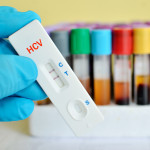An antioxidant component of green tea blocks the ability of the hepatitis C virus (HCV) to enter liver cells (hepatocytes), making it potentially useful in protecting the liver against infection with the virus, notably following transplant surgery when there is a high risk of disease recurrence. This is the conclusion of a study conducted by German, Belgian and Canadian researchers and published online by the journal Hepatology late last month.
Green tea is a nonoxidized, unfermented product of leaves from Camellia sinensis, an evergreen plant. It is made up of catechins, chiefly epigallocatechin gallate (EGCG), and has been credited with possessing health benefits, including properties that help prevent cancer and cardiovascular disease. Studies have also suggested that EGCG can prevent HIV from binding to and infecting immune system cells.
At least some of the interest in EGCG for hepatitis C involves a significant shortcoming of liver transplants. Even after a person receives a liver from a donor not infected with HCV, the virus in the transplant recipient lingers in the blood and in almost all cases begins attacking the new organ almost immediately. For some transplant recipients, the infection recurrence can lead to severe liver disease within months.
Various drugs that are being tested as treatments for chronic HCV infection are also being explored as potential methods to prevent infection from recurring in transplanted livers.
While standard treatment with interferon and ribavirin plus newer protease inhibitors may clear infection in some individuals, a substantial number of people still may not respond to these therapies. For those receiving liver transplants because of complications from HCV, recurrence of HCV infection in the healthy donor liver remains a significant concern. Antiviral strategies that target HCV in its early stages are urgently needed to prevent reinfection and to improve long-term outcomes for transplant recipients.
EGCG may prove to be a viable option, though human clinical trials have not yet been conducted. According to the test tube studies reported in Hepatology by Sandra Ciesek, MD, of the Hannover Medical School in Germany and her colleagues, pre-treatment of hepatocytes with EGCG before being exposed to HCV did not reduce the infection. However, when the cells were exposed to the green tea extract component at the same time as HCV, rapid spread of the virus was inhibited.
Ciesek and her colleagues also showed that EGCG inhibited viral attachment-the initial stage of infection wherein the virus adheres to a host cell to inject its genetic material. The authors further observed no change in viral particle density, suggesting that EGCG acts directly on the liver cells.
“Green tea catechins such as EGCG and its derivatives epigallocatechin (EGC), epicatechin gallate (ECG) and epicatechin (EC) have been shown to exhibit antiviral and anti-oncogenic properties,” noted Ciesek in an accompanying statement. “Our study further explores the potential effect these flavonoids have in preventing HCV reinfection following liver transplantation.”






Comments
Comments